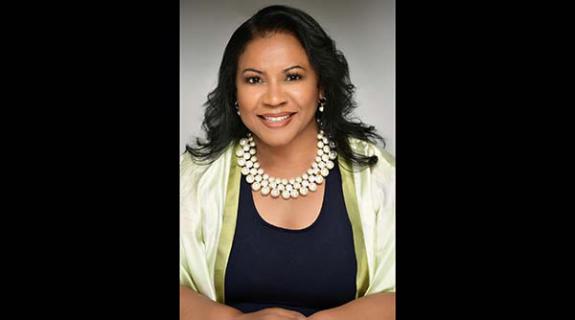After the death of George Floyd last spring, PBS President and CEO Paula Kerger took stock of the organization she oversees and evaluated whether it was living its values, she said at Tuesday’s virtual meeting of the Television Critics Association’s virtual summer press tour.
“An organization like PBS has a long legacy of attempting to reflect our country and the diversity of it,” Kerger said. “I think we don’t always look as carefully in the mirror and recognize that there are areas where we are not doing our best.”
Kerger decided to work toward improving that performance both internally with new hires and externally with programming initiatives focused on diversity, equity and inclusion.
Cecilia Loving (pictured above) is joining the organization as senior vice president of diversity, equity and inclusion and will report directly to Kerger.
“When I first came to PBS, I had a head of diversity and that didn’t work as well as I had hoped. I thought it would be good to have someone at that level working in our organization but I hadn’t put enough thought into what would make that position successful. It has to be a shared commitment across the organization,” Kerger said.
“This is very complex, particularly when you look at our stations that are attempting to serve their communities. I realized we would benefit very much from someone who has deep expertise in this area and would work in close partnership with me. Cecilia reports directly to me but also has an executive leadership team.”
Loving, who comes to the organization from the New York City Fire Department where she was deputy commissioner, chief diversity and inclusion officer, will oversee her own executive leadership team, which includes human resources, Kerger said. She also will work across the national public television system to support member stations’ ongoing diversity and inclusion efforts.
The organization also updated its producing criteria across all platforms—including PBS General Audience Programming, PBS Digital Studios and PBS Kids—requiring producers to come in with DEI plans from the proposal stage, follow through with those plans through production and then report on how those plans were executed once production concludes.
“PBS works closely with producing partners, station producers and individual creators to distribute educational and thought-provoking content to millions of viewers each year,” said Sylvia Bugg, PBS chief programming executive and general manager, general audience programming, in a statement. “Our updated criteria and reporting standards will ensure that the content distributed across PBS platforms continues to reflect the diversity of the audiences we serve.”
Producers of PBS Kids content must include a written overview of how their projects and staffing efforts support the values already outlined in PBS Kids’ Commitment to Diversity, Equity and Inclusion.
“All children should grow up believing that the world is full of possibilities, and so are they,” said Linda Simensky, head of content for PBS Kids, in a statement. “When children see authentic, positive representations of themselves in media, it has a measurable effect on their self-esteem and long-term success. PBS Kids and our partners believe that authenticity doesn’t happen by accident, but rather through intentional efforts affecting all areas of production—and that the resulting content is made richer and more impactful in the process.”
PBS, through the Corporation for Public Broadcasting (CPB), also gave and received several grants intended to move it and its partner producers more towards PBS’ diversity goals.
PBS Digital Studios received a $3 million grant from the CPB to establish three regional digital centers of innovation to both build its digital capacity and to create a new platform of multi-platform content. Each center will partner with up to three PBS member stations to work in the community and produce new digital series intended to elevate the voices of diverse, local content creators both behind and in front of the camera. PBS expects that the first shows under the initiative will begin rolling out on YouTube and, in some cases, Facebook, TikTok and IGTV, in the spring of 2022.
CPB and PBS partnered to award documentary producer Firelight Media $5.5 million over three years in service of increasing the diversity of public media content. The funding will more than double the number of filmmakers served by three Firelight programs, including the Firelight Documentary Lab, with an emphasis on such populations as Native Americans and Pacific Islanders.
Finally, PBS Digital Studios will launch new science, technology, engineering and mathematics (STEM) content with a $2.5 million grant from the National Science Foundation’s Advancing Informal STEM Learning. That content will live on PBS Terra, PBS’ science-themed hub on YouTube.
Part of the project’s mission will be to create more STEM-focused content by women, Black and Hispanic creators considering that YouTube’s most popular STEM creators are disproportionately white and male.
Taking all of these initiatives into consideration, “I think there is a lot that can be accomplished that can be significant not just for PBS but that I hope can be a model for the rest of the industry as well,” Kerger said.
Tags: corporation for public broadcasting paula kerger pbs pbs kids













































__twocolumncontent.jpg)











